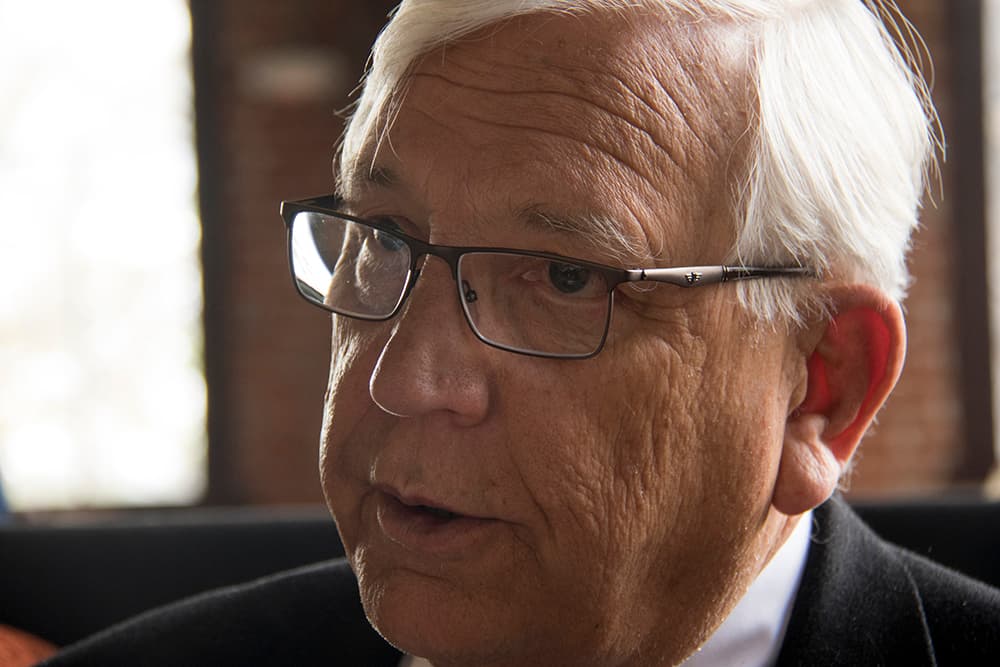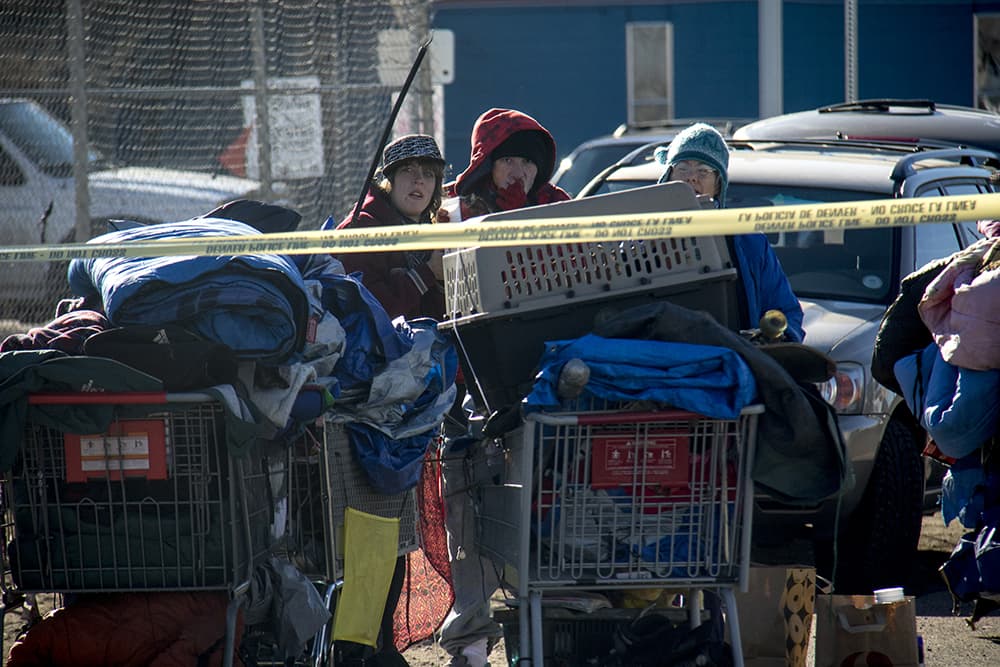
It's a pretty widespread idea and one for which it's not hard to find anecdotal evidence. This would be the idea that Colorado in general and Denver in particular have gone to pot, with hordes of homeless people flocking to the state to partake without fear of legal consequences.
I put this question to Donald Burnes, founder and co-chair of the Burnes Center on Poverty and Homelessness at the University of Denver's School of Social Work. He does research on the policy around homelessness, as well as on public discourse and the effectiveness of programs.
He said it's an area that needs more research to have a definitive answer, but all the evidence to date is that it's not happening. Surveys of the homeless population just don't show a huge increase in the numbers of people moving here from other states. Most homeless people in Colorado lived here before they became homeless.
Here's a transcript of our conversation, lightly edited for length and clarity:
There seems to be this widespread idea that legal cannabis is attracting people to the city. What do you know about that, and how do you know it?
There are a number of sources of information. I’ve talked to a number of directors of service agencies who say they’ve seen a rise in the number of people seeking services. They indicate there is some increase in the number of people who are there because of cannabis. However, the best data we have -- and it’s frankly not great data -- it comes from something called the annual Point-in-Time survey … There’s a question on the Point-in-Time survey: Where is the last permanent housing place that you lived? Based on that question, we can look at numbers of folks who are now in the metro area but consider a location outside of Colorado the last place that they lived. Those data, imperfect though they may be, suggest there has not been a substantial increase in the people coming from out of state.
So, independent of the reason people might come here, we haven’t seen the number of people moving here from other states go up?
Not significantly. We have seen an average of 100,000 people a year coming into the state. That clearly has fueled increases in the numbers of people experiencing homelessness. We don’t think the numbers of people coming for marijuana has increased substantially.
Now, one of the things that may be happening as people move here from other parts of the country is housing prices go up, which has a negative effect at the low end of the ladder, which contributes to homelessness. We don’t see any evidence that large numbers of people are showing up to smoke pot.
Why is that perception so widespread?
It’s an easy answer. There is no doubt that there is an increase in the numbers of homeless, not a large increase, but some increase over the last several years, and it tends to coincide with the 2012 ballot decision and 2014 actual legalization. It becomes an easy target. The unfortunate thing is what it does is reinforce a negative stereotype that all people experiencing homelessness are stoners, which is simply not true.
The Point-in-Time survey asks people what the reason they became homeless is and addiction to substances is pretty low in the list. It’s losing jobs, it’s the cost of housing and it's family break-up. Things like that. Mental illness and substance abuse is pretty low down on the list. And that’s both in the city and across the metro region.
What are some of the limitations in that Point-in-Time survey?
How long do you have? Enumerating this population is probably the most difficult enumeration you can do. Lots of folks don’t want to be counted. Lots of folks will not fill out surveys. Lots of folks want to be hidden. ...One of the problems is it has to be done at a certain time and you have to get lots of volunteers, and that is difficult.
But it’s the best data we have.
And what percentage of the homeless population comes from out-of-state?
It's somewhere between 12 and 16 percent in any year come from out-of-state. There are lots of reasons to come to Colorado. In 2016, Denver was considered the fastest growing city in the country. Marijuana was not listed as one of the reasons. You talk about the mountains, you talk about winter sports, you talk about summer sports, you talk about a millennial magnet. You talk about lots to do in the city.
We did a survey of people sleeping in camp sites on Clear Creek in Aurora. We talked to one guy who was here with his wife from Arkansas. We asked him why he moved here, and he said, “Look at the mountains. It sure beats Arkansas.” He did not talk about coming for pot.
(Later in the conversation, Burnes had another observation about legal marijuana.)
Legal recreational marijuana is not particularly cheap, and there are other drugs that are cheaper and more readily available if you know the right people. It’s not just pot. We know that heroin, that use of various opioids, including prescription drugs, has skyrocketed in recent years. Maybe we should be paying more attention to that.

What would it take to get a better handle on this?
We would have to do a much more in-depth study. People are not going to admit initially, 'Oh yeah, I came here to smoke pot,' but my guess is that in an extensive interview with the appropriate prompts, you could get at that. But that’s costly.
The best data we have now is simply: Have you come from another state?
(Note: The Point-in-Time survey occurs in January and wouldn't count people who arrive in the summer as part of the traveler circuit or people who come for events and festivals and hang around for a few months.)
What are the policy implications of this belief? Does that change the types of policies that we have? Does it change support for those policies? Does it matter if we get a good answer?
Regardless of why people come here, the real policy question is: How do we end homelessness? And that’s a very different question. The cost of housing is skyrocketing. Right now, in Denver, it takes almost an hourly wage of $24 an hour to afford a modest 2-bedroom housing unit. That’s almost three times the minimum wage. ... We are way behind on housing. And the answer does not include housing alone. For some folks it includes services.
What the mayor and City Council did in the fall in terms of the local housing trust fund, that’s fine. I applaud that. But a year or so ago, the regional director of Housing and Urban Development said that in this metro area, we have a deficit of about 225,000 housing units for people who are seriously housing challenged or who are experiencing homelessness. Creating 6,000 units over 10 years is a little short of 225,000.
(Note: Only a portion of the 6,000 units the city will create or preserve will go to the very poor or the homeless. The affordable housing fund will also be used for so-called "workforce" housing for people who might be considered middle class in less expensive cities.)
Gov. John Hickenlooper asked that marijuana tax money be used to fund housing for the homeless. One of the justifications he gave was that marijuana is contributing to homelessness. If it ends up generating tax money for housing, is it okay if people have this misconception?
Burnes gave a deep sigh at this question.
I strongly applaud the governor for trying to put money into affordable housing. Unfortunately I think the misperception tends to reinforce negative stereotypes. More than anything, I feel strongly that if we really are going to adequately address the problem, we need to change public attitudes about homeless. I love the money coming in, but I really hope we can educate people to the realization that the negative stereotypes and misconceptions really are wrong. The vast majority of homeless people are not the folks you see on the streets. They represent only 15, 20 percent. Most of the folks are invisible so we don’t see them, but their issues are just as serious as the street folks. So I have very mixed reactions to your question.
Is there anything else people should know?
The other thing that all this raises is: Why do people become homeless? There is this notion that people become homeless because they are drunks, druggies, lazy, crazy, bad choices. But there are a lot more people who are housed who are drunks, who are druggies, who have mental illness, and who among us has not made a bad choice? The real issue is economic and systemic. I cannot tell you how strongly I feel about that.
Correction: This article has been updated to reflect the correct number for the deficit of affordable housing. It is 225,000 units.











